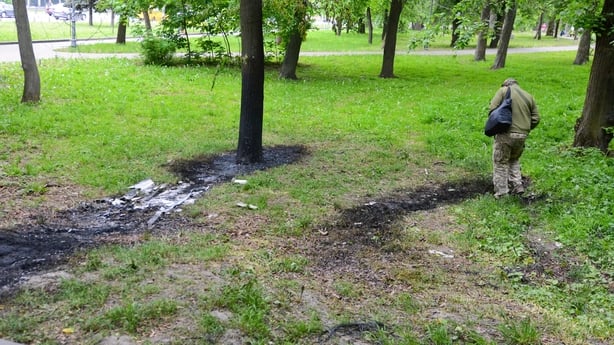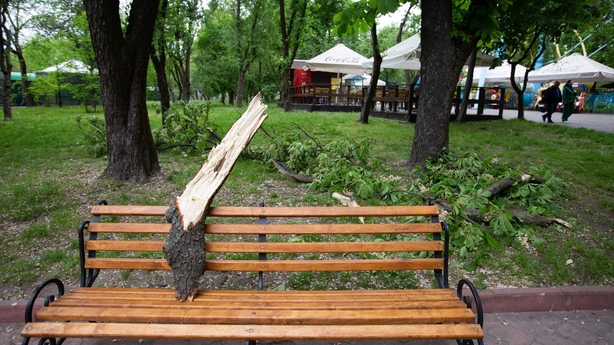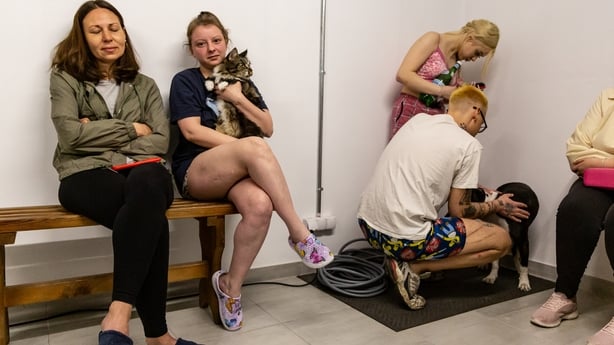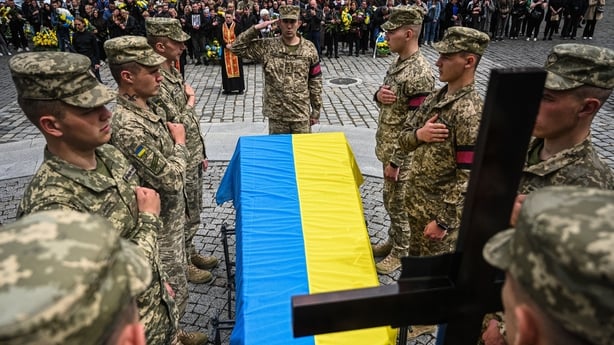Ukraine said it had shot down six Russian Kinzhal missiles in a single night, thwarting a weapon Moscow has touted as a next-generation hypersonic missile that was all but unstoppable.
It was the first time Ukraine had claimed to have struck an entire volley of multiple Kinzhal missiles, and if confirmed would be a demonstration of the effectiveness of Kyiv's newly deployed Western air defences.
Air raid sirens blared across nearly all of Ukraine early this morning and were heard over the Ukrainian capital and the surrounding region for more than three hours.
"The enemy's mission is to sow panic and create chaos. However, in the northern operational zone (including Kyiv), everything is under complete control," General Serhiy Naev, Commander of the Joint Forces of the Armed Forces, said.
The six Kinzhals were among 27 missiles Russia fired at Ukraine over the past 24 hours, Ukraine's military General Staff said in its evening update, lighting up Kyiv with flashes and raining debris after they were blasted from the sky.
It was not clear which Western weapon Ukraine used to defeat the Kinzhals. The Pentagon had no immediate comment.
Russian Defence Minister Sergei Shoigu dismissed Ukraine's claim, saying Moscow had not launched that many Kinzhal missiles, RIA news agency said.
RIA quoted Mr Shoigu as saying Kyiv claimed to have shot down three times as many missiles as Russia had actually fired. His remarks, as cited by RIA, did not appear to refer specifically to the latest strike.
Ammunition storage sites targetted
For its part, Russia's defence ministry claimed to have destroyed a US-built Patriot surface-to-air missile defence system with a Kinzhal missile, the Zvezda military news outlet reported.
But the commander-in-chief of Ukraine's armed forces, Valeriy Zaluzhnyi, said all had been successfully intercepted.
Kyiv authorities said three people were wounded by falling debris.
"It was exceptional in its density - the maximum number of attack missiles in the shortest period of time," Serhiy Popko, head of Kyiv's city military administration, said on Telegram.
Zvezda quoted the Russian ministry as saying the attacks had been aimed at Ukrainian fighting units and ammunition storage sites.

Mr Zaluzhnyi said his forces had intercepted the six Kinzhals launched from aircraft, as well as nine Kalibr cruise missiles from ships in the Black Sea and three Iskanders fired from land.
Two S-300 missiles targeted infrastructure in Kostyantynivka, west of the embattled eastern city of Bakhmut, the General Staff update said.
Earlier this month, Ukraine claimed to have shot down a single Kinzhal missile over Kyiv for the first time using a newly deployed US Patriot air defence system.
The US military confirmed that account but did not say whether the Russian missile was flying at hypersonic speed at the time of the intercept.

The US-based Center for Strategic and International Studies (CSIS) says the Kinzhal rapidly accelerates to Mach 4 (4,900 kms/h) after launch and may reach speeds of up to Mach 10 - or 10 times the speed of sound. Hypersonic weapons travel at least five times the speed of sound.
The Kinzhal missile, whose name means dagger, can carry conventional or nuclear warheads up to 2,000 kilometres.
Russia used the weapon in warfare for the first time in Ukraine last year and has only acknowledged firing the missiles on a few occasions.
Russian President Vladimir Putin has frequently touted the Kinzhal as proof of world-beating Russian military hardware, capable of taking on NATO.
With Ukraine set to go on the offensive against Russia's invasion for the first time in six months, Moscow is launching longer-range air strikes at the highest frequency of the war.
Kyiv says it is shooting down most incoming missiles and drones.
'Under control'
Ukrainian troops have reclaimed about 20 square kilometres of land around Bakhmut in recent days but Russian forces had advanced slightly in the city itself, Deputy Defence Minister Hanna Maliar said.

The epicentre of ground fighting remained Bakhmut and Maryinka just to its south, the General Staff update said, though Russian shelling of three towns in the northeast Kharkiv region had left some dead and wounded.
Kyiv has stressed that any gains around Bakhmut are not part of a broader counteroffensive.
Moscow has acknowledged that some of its troops have retreated but denied that its battle lines are crumbling.
Kyiv's counteroffensive is expected to take advantage of hundreds of modern tanks and armoured vehicles sent by the West and mark the next major phase of the war after a Russian winter offensive that failed to take significant new territory.
Moscow mounted its full-scale invasion of Ukraine in February last year and now claims to have annexed around a sixth of its neighbour's territory.
Ukraine turned back Russian troops from the outskirts of Kyiv early in the war and recaptured territory in two counter-offensives in the second half of 2022 but has kept its forces on the defensive since November.
Russia says its invasion was necessary to counter threats to its security posed by Ukraine's growing ties to the West.
Kyiv and its allies call it an unprovoked war of conquest. Kyiv says it will not stop fighting until all Russian forces leave its land.
On the diplomatic front, European leaders began a two-day summit in Iceland to focus on ways to hold Russia to account for its war. They are expected to approve a new Register of Damages that would record and document evidence and claims of damage, loss or injury incurred as a result of the invasion.

EU leaders in Iceland to count cost of Russia's war
Ways to hold Russia to account for its war against Ukraine, including keeping a tally of losses and damage inflicted by Moscow's forces, were the focus of talks as European leaders met in Iceland for a two-day summit.
German Chancellor Olaf Scholz, French President Emmanuel Macron and British Prime Minister Rishi Sunak are among the leaders who are underscoring their support for Ukraine in a rare meeting of the Council of Europe (CoE) rights body.

Ukraine's President Volodymyr Zelensky is expected to address the gathering remotely following his tour of European capitals to secure more weapons and aid prior to an anticipated counteroffensive to push back Russian forces.
"A big topic will be the accountability of Russia for the crime of aggression it is constantly committing by waging war in Ukraine," President of the European Commission Ursula von der Leyen told reporters.
The leaders are expected to approve a new Register of Damages, a mechanism to record and document evidence and claims of damage, loss or injury incurred as a result of the Russian invasion.
Russia has denied deliberately targeting civilians in bombing Ukrainian cities, although dozens of towns and cities have been laid to waste by its air strikes and artillery since the invasion began in February last year.

